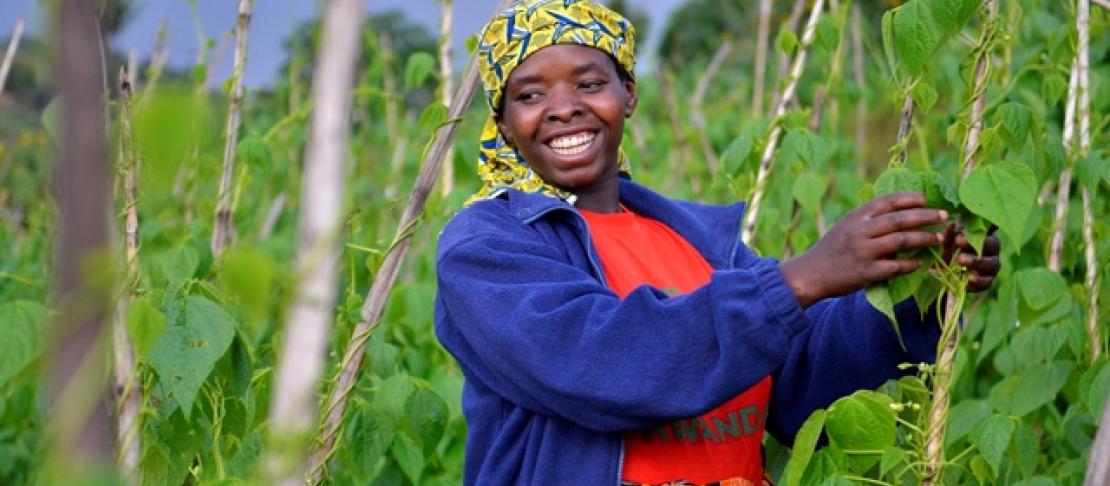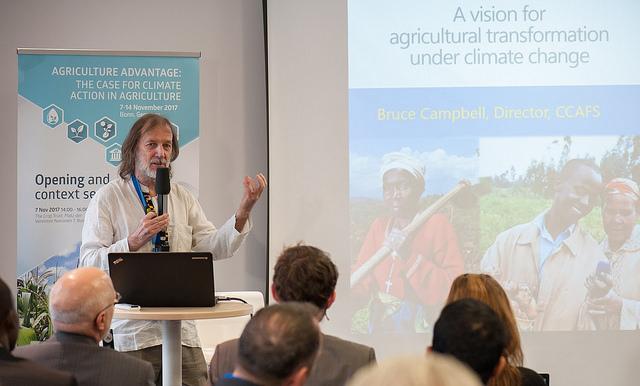Setting a vision for agricultural transformation under climate change

At COP23, we kicked off the Agriculture Advantage event outlining the framework for agricultural development under climate change.
Both part of the cause of climate change, but also part of the solution, agriculture is central to any debate on global warming and extreme weather events. The interactions between the agricultural sector and climate change have undeniable implications for both global food security and our environment.
The Intended Nationally Determined Contributions (INDCs) under the Paris Agreement overwhelmingly prioritise the sector for climate action. 119 countries include agricultural mitigation in their INDCs, and of the 138 countries that include adaptation, almost all (127) include agriculture as a priority (Richards et al. 2016). Agriculture is also key to achieving the Sustainable Development Goals set by countries.
“Agriculture Advantage: The case for climate action in agriculture” is an initiative and collaboration effort between different organizations with the same mission to transform agricultural development in the face of climate change. The event aims to articulate the different dimensions of climate actions in the agricultural sector.
At the opening event, speakers set the vision and discussed the different dimensions of climate action in agriculture, as a prelude to the six events organized on more specific topics during the COP23.
Watch the video recording of the event:
Simon Winter, Executive Director of Syngenta Foundation for Sustainable Agriculture gave a presentation on the need for effective multi-stakeholder engagement to deal with the complex challenges of climate change.
Watch Simon Winter's presentation on the CCAFS youtube channel.
He stressed the importance of investing in smallholder agriculture, highlighting the challenges of such investments:
Many insurance projects have failed to achieve the scale to outlive the grants that funded them. Premium subsidies can help drive adoption, but are not always available, and may well not be sustained. Furthermore, even where they work, insurance products alone are not enough."
He also expressed the importance of private-public partnerships and scaling up solutions. Though much work has been done in the past in the private-public partnership arena, "we need to do more in order to have system-wide, landscape-level and, in due, course country-wide impacts that improve smallholders' ability to deal with climate change risks and invest in modernisation of their farming enterprises."

Photo of Bruce Campbell at the opening event. Photo: Michael Major (Crop Trust)
Bruce Campbell, Director of CCAFS, delivered his presentation on a vision for agricultural transformation under climate change.
He argued that agricultural transformation is crucial for various reasons. For example, it's unacceptable that almost a billion people are going hungry, while we waste one third of the food we produce. Agriculture is also a major contributor to greenhouse gas emissions therefore focus on mitigation is crucial.
Many organizations, such as the Green Climate Fund (GCF), the International Fund for Agricultural Development (IFAD), the African Development Bank, to mention a few, are behind the agricultural transformation agenda.
How to drive agricultural transformation under climate change?
How to drive agricultural transformation under #climate change, according to @bcampbell_CGIAR #AgAdvantage #COP23 pic.twitter.com/s6jLauh5BX
— CCAFS cgiarclimate (@cgiarclimate) November 7, 2017
It is absolutely crucial that the policy framework is right. "Playing around with projects which do not align with policies is absolutely a waste of time," he added. At the same time, farmers have to be at the center; there is need for strong farmer organizations to demand better services.
Dr. Campbell shared a few examples of innovative climate-smart technologies that address the triple challenges of adaptation, mitigation and productivity, such as alternate wetting and drying in rice systems and solar-powered irrigation.
While there are many innovations for climate actions in agriculture, change has to come from within; farmers have to be willing to change their farming practices for transforming agriculture under climate change.
What's the Agriculture Advantage? Watch this video:
Investing in agriculture and agricultural research and innovation is not only about increasing productivity and improving livelihoods, but such investments can help deliver benefits for gender, land, water, low emissions development, institutional capacity building, and entrepreneurship, under a changing climate.
After the presentations, speakers discussed the different dimensions of climate action in agriculture.
Karl Deering from the CARE Climate Change and Resilience Platform, laid out key reasons why gender has to be at the center of the agricultural transformation. First, a significant amount of farming is done by women. Second, household nutrition improves when there are more incentives for women. And third, "we're speaking about the realization of basic human rights," he added.
Ilaria Firmian from the International Fund for Agricultura Development talked about the business aspect of climate action in agriculture. She stressed the importance of private sector involvement and scaling up private sector investment.
"We need more investments in #agriculture; without investment, we can't achieve any #ag transformations" @Iliaria @IFADnews #AgAdvantage
— CCAFS cgiarclimate (@cgiarclimate) November 7, 2017
Jan Low from the International Potato Center (CIP) shared why innovations in land and water management are crucial to help transform agriculture under climate change. There are possibilities for really sustaining agricultural productivity in a small-scale farm setting with technological innovations that can drive transformation.
Mark Ellis-Jones from F3 Life introduced climate finance for low emissions development. There are emerging financial instruments that have the potential to mainstream climate change mitigation in agriculture which will be discussed at the side event.
Lucy Ng'ang'a from the Ministry of Agriculture in Kenya said that policy is the one thing that drives action; everything has to be entrenched in policy. If there is a policy addressing food security, it addresses poverty.
"Even if everything that has been mentioned thus far is in place, you will still need seeds that grow reliably well in a particular place and that means you will need breeding," said Luigi Guarino from the Crop Trust in relation to the breeding advantage.
Panellists present gender, land&water, business, policy, low emissions & breeding advantages for climate action in agriculture #AgAdvantage pic.twitter.com/lDuIq2kZEr
— CCAFS cgiarclimate (@cgiarclimate) November 7, 2017
After a moderated Q&A discussion, Ines Dombrowsky from the German Develipment Institute (DIE) delivered closing remarks and invited all participants in the room and virtual audience to attend the upcoming sessions of the Agriculture Advantage event series.
READ
- Event page: Agriculture Advantage event series
- Read the summaries of the sessions on the CCAFS blog
- Dinesh D, Campbell B, Bonilla-Findji O, Richards M (eds). 2017. 10 best bet innovations for adaptation in agriculture: A supplement to the UNFCCC NAP Technical Guidelines. CCAFS Working Paper no. 215. Wageningen, The Netherlands: CGIAR Research Program on Climate Change, Agriculture and Food Security (CCAFS).
WATCH
- Video: Agriculture Advantage: The case for climate action in agriculture
- Event recordings: CCAFS at COP23 playlist
- Presentations: CCAFS Slideshare
- Photos: CCAFS Flickr
Lili Szilagyi is the Communications Consultant at the CCAFS Program Management Unit.
